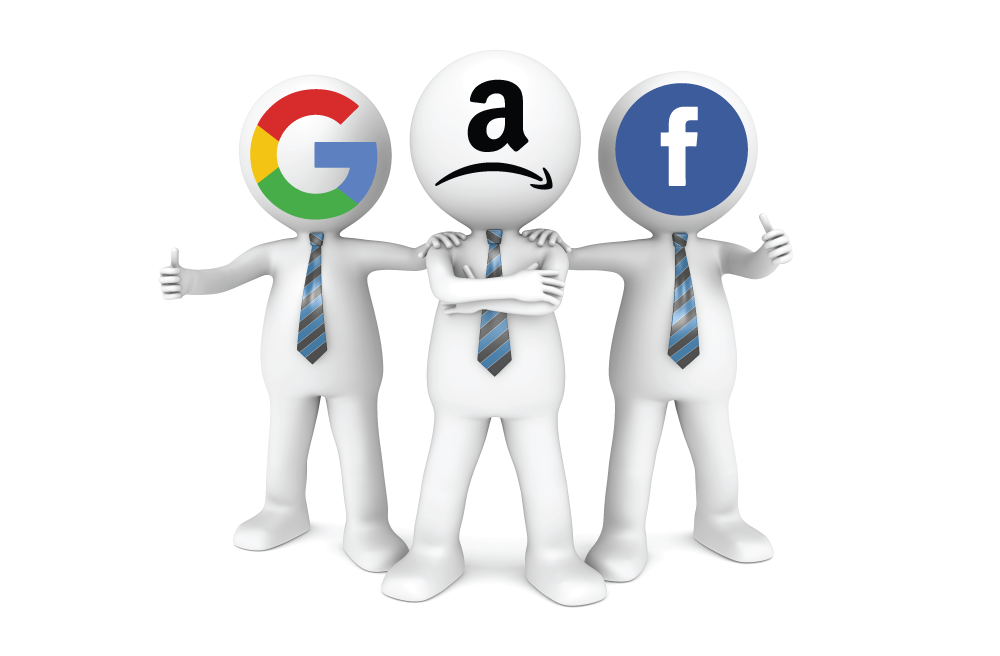Politics
In Understatement of the Century, Treasury Secretary Mnuchin says Amazon “destroyed the retail industry”
Published
5 years agoon
Teeth or not in Inquiry? Jawboning or action for Targeted Tech?…
Commenting on the antitrust review announced by the Justice Department on Tuesday, in an interview on CNBC, Mnuchin said that “it is good that the attorney general is going to look into this”.
Also saying that Amazon has “limited competition”, “hurt small businesses”, and that it was “absolutely right” for the Attorney General to look into “these issues”.
Read More: Is Jeff Bezos soon to be World’s First Trillionaire? No Chance in Hell. Here’s Why
Amazon "has destroyed the retail industry across the United States," says Treasury Secretary Mnuchin. "It's absolutely right the Attorney General is looking into" anti-trust issues. pic.twitter.com/z5Mhc96xMa
— Squawk Box (@SquawkCNBC) July 24, 2019
On Tuesday, the Justice Department announced via press release that it would initiate a review to determine if major online platforms had “reduced competition, stifled innovation or otherwise harmed consumers”.
”The Department of Justice announced today that the Department’s Antitrust Division is reviewing whether and how market-leading online platforms have achieved market power and are engaging in practices that have reduced competition, stifled innovation, or otherwise harmed consumers.”
Department of Justice Release from Tuesday, July 23, 2019
Interestingly, the idea of some kind of antitrust action against Amazon, Google or Facebook is one that is gaining traction among Republicans and Democrats alike. Senator Elizabeth Warren in particular has often spoken of the need for intervention.
Read More: A Bully with a “Nice” Promise is Still just a Bully: Big tech Behemoth Plays Coronavirus Card
Each of the “market-leading online platforms” have built-in defenses against traditional antitrust actions, which have traditionally looked for dominant companies where consumer prices were directly impacted by use of monopoly profits (such as in United States v. AT&T and later, v. Microsoft).
In the case of Facebook and Google, profits are hidden behind “free” products and services which allow the companies to claim that no harm comes to consumers as a result of their power. Naturally, the idea that the products and services come without cost is losing credibility in light of the many scandals and instances of harm, monetary or otherwise.

Kindergarten Colors and “Consumer Obsession” while Evil Lurks Beneath…
In the case of Amazon, it is even more complex, since, as a company famous for enormous losses rather than profit, all while using various loss leader strategies to prove that it is “consumer obsessed” and not a monopoly at all.
Indeed, Amazon’s response to the Justice Department’s press release was, through a spokesman, that Amazon accounts for “less than 4% of US retail sales” and that “small and medium-sized businesses are thriving with Amazon”. Not mentioned was the dominant 50% share of the online sales market.
By comparison the second largest online sales channel, eBay, for 2019 is estimated to reach 6.1%, while Walmart’s online platform has an approximate 4.6% share.
Rarely has the media been able (or willing) to unravel the deeply complex history of Amazon’s strategies – which can be traced all the way back to the incredibly favorable pricing of it’s stock during the dot.com bubble boom and it’s “stealth” transformation from “The World’s Largest Bookstore” into “The Everything Store” over a ten year period.
The closest definition for its business behavior is as a “monopsony”, which can be defined as holding a monopoly over suppliers or labor, not consumers.
And this is where the “hurt small businesses” comes in. Any small retailer wishing to survive, let alone make a profit, must have online sales in some form (ask Walmart if you doubt that online sales are a necessary requirement for a brick and mortar retail business in 2019) and the domination in that area – that is to say the control of the customers, by Amazon is so extreme that joining the Amazon Marketplace is the only option (other than trying to survive with 90% fewer online sales).
And the Marketplace is controlled with an iron fist by Amazon. For example, since around 2006 all communication between Amazon Marketplace sellers and their buyers is handled by an encrypted, anonymous messaging system designed to prevent sellers from obtaining any direct email addresses from buyers.
This amazingly elaborate system is a glaring indicator, hiding in plain sight, that Amazon views its “selling partners” as anything but.
Although third-party sellers accounted, for example, for 50% of paid units sold on Amazon in 2016, every customer was considered to belong 100% to Amazon and zero percent to the seller.
With fees that can total up to 50% (they use a complex exponential sliding scale which makes it impossible to quote any exact figure) the seller is doomed to have no brand value and no “good will” value as long as it agrees to cooperate on the platform. Not selling on Amazon, unless extremely well capitalized (such as a start-up with hundreds of millions of dollars), is a death sentence.
Naturally, the waters remain muddy, since examples of the precise opposite can be pointed to – if you are a manufacturer and your products are extremely cheap (you are probably in China) and you like to offer your margin to Jeff Bezos as “his opportunity” and, particularly if your products will harm an Amazon competitor that refuses to sell on Amazon, the red carpet will be laid at your feet.

3 Brands Take Over Earth, Almost No-one Notices
It’s odd, as an observer, to note that there is not a single “brand success story” that can be pointed to as having built their brand through the Amazon third-party Marketplace. Could this be more than a coincidence?
”What I am glad we never did and that we’ve avoided so far is being on Amazon”
Jen Rubio, co-founder and chief brand officer of Away
Take, for example, Away Luggage, who went from being a “direct to consumer” start-up founded in 2015 to recently reaching a valuation of over one billion dollars and who made it a point NEVER to sell on Amazon;
She added that a “deal breaker” was that Amazon does not share customer data with vendors.
”Just sticking to our guns and not going on the [Amazon] platform was important for us”
Jen Rubio, Away
In our own recent interview with a long time Amazon Marketplace seller, who insisted on not being named, “or my children’s lives would be in danger”, he stated that many more behaviors towards seller “partners” are anything but collegial.
One of many examples is the “co-mingling” policy. As with much of what goes on behind the scenes at Amazon, this is an opaque, complex concept where all products that reside in any Amazon warehouse (supplied by various sellers participating in the “Fulfillment by Amazon” program) are considered to be “co-mingled” once they arrive.
When an item is purchased from a particular seller any item from any supplier is “picked” and shipped to the buyer. If that item is somehow inferior or even counterfeit, the seller whose name is on the order is automatically blamed although there is no way to trace the item’s true origin.
Our anonymous interviewee stated that, in one case, he was put out of business and even sued as having sold a counterfeit item, even though all his inventory was purchased from the original authorized manufacturer, and he could prove it.
Why didn’t he fight the false and obviously bogus accusation? $50,000 to $100,000 in Legal fees and no chance of any remedy other than, perhaps, re-instatement with no guarantee that the same thing wouldn’t happen again 2 days later.
One could get the impression, surveying the various accounts from sellers, across many walks of life, that Amazon’s perspective is not only that it is unimportant what happens to a particular seller that runs into problems on its platform, but that the demise of any seller is a “win” and that harm to any seller is harm to a competitor, even if that entity is technically a “Marketplace Partner”.
If true, this is as disturbing as any “consumer harm” effected through higher prices, as the sellers, who are also consumers let’s not forget, are just as trapped in the platform’s private “hell” as any consumer who is forced to pay higher prices as a result of monopolistic behavior.
Stories like the one above are “out-there” by the thousands but, strangely, hard to find online. A search on Google (oh yes, one of the other companies being scrutinized by the Justice Department) for “Amazon harms sellers” would often, in the recent past, bring up nothing but links to Amazon itself and how it is harmed by “counterfeit sellers” as if all the problems on the platform are created by the “other guy”.
Interestingly, even that is beginning to change, and there are more and more articles by reputable outlets such as Forbes , The Verge and INC who are daring to take information publicly gathered, as in our case, often from anonymous sources fearing retribution, and report on it without fearing similar retribution to its own organization. It seems likely more such stories will be published in the coming days and months. And perhaps, as they say, one day, the chickens will come home to roost.
Find books on Big Tech, Sustainable Energy, Economics and many other topics at our sister site: Cherrybooks on Bookshop.org
Enjoy Lynxotic at Apple News on your iPhone, iPad or Mac and subscribe to our newsletter.
Lynxotic may receive a small commission based on any purchases made by following links from this page.


